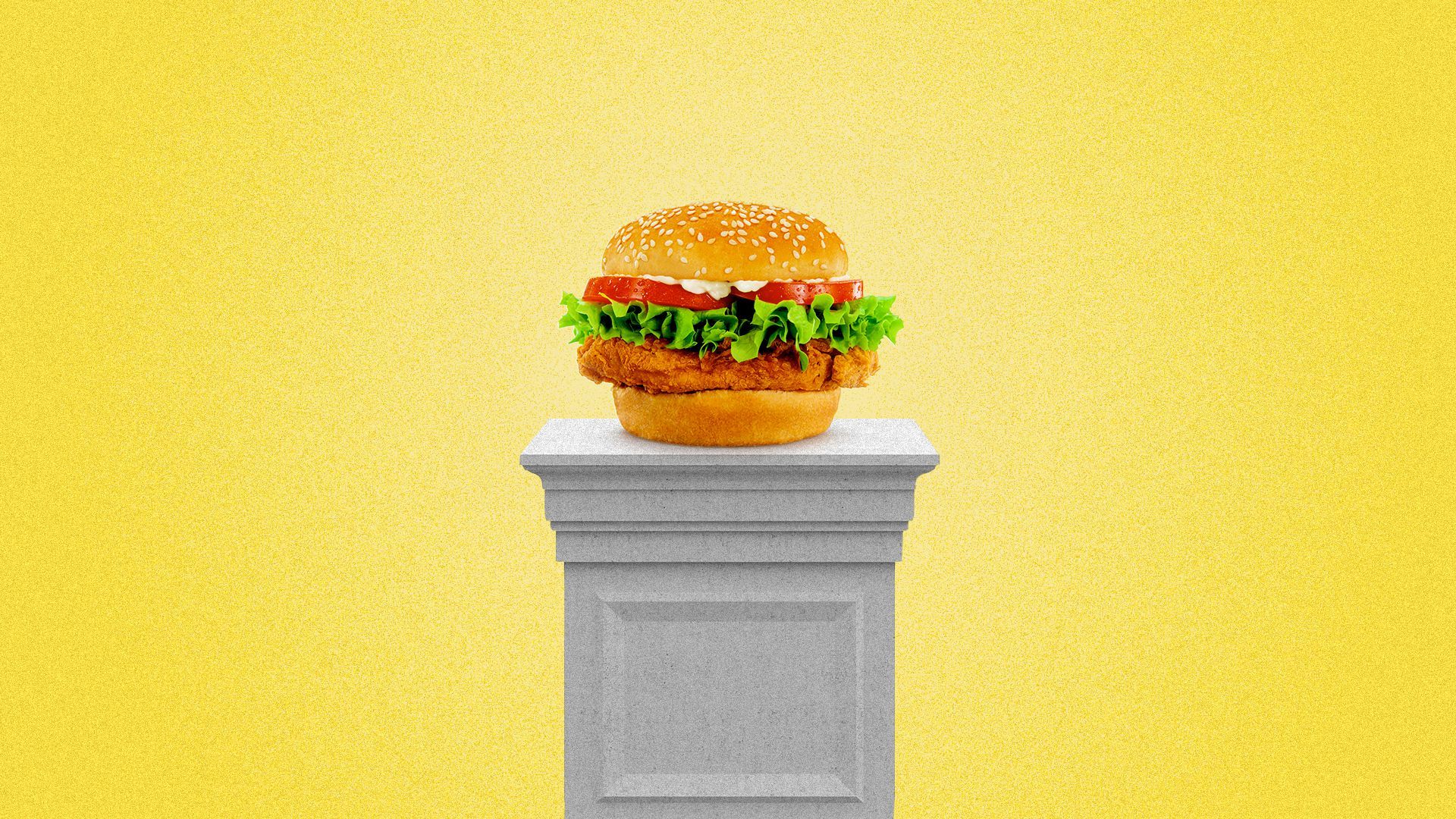| |
| |
| |
| Presented By PhRMA |
| |
| Vitals |
| By Tina Reed ·Jun 02, 2021 |
| Good morning and thanks for reading Vitals. Today's word count is 902, or a 3-minute read. Situational awareness: The AMA announced Howard Bauchner will step down from his role as editor in chief of the Journal of the American Medical Association later this month. - Bauchner had been on administrative leave during a review of a JAMA podcast and tweet by a colleague denying racism in medicine.
|
| |
| |
| 1 big thing: Mental health in sports comes into sharp focus |
 |
|
| Naomi Osaka of Japan serves during her Women's Singles second round match against Saisai Zheng of China in January 2020. Photo: Quinn Rooney via Getty Images |
| |
| Tennis player Naomi Osaka's withdrawal from the French Open sparked conversations on the mental health pressures athletes face and the obligations leagues have to accommodate them, Axios' Marisa Fernandez writes. Why it matters: Athletes are increasingly addressing the lack of mental health accommodations, experts say. - "It's good to see this generation is taking mental health and treating it like it should be treated which is just health," Georgia Gaveras, chief psychiatrist at mental health startup Talkiatry, tells Axios.
Context: Osaka on Monday dropped out after officials threatened to expel her from the season's second Grand Slam tournament for not partaking in media sessions. - She also said she has suffered from "bouts of depression since the U.S. Open in 2018."
The big picture: Osaka, 23, also shows how younger generations are much more likely than other generations to talk about their mental health. - More than 70% of both Gen Z and millennials said they have received treatment or therapy from a mental health professional, compared with 26% of Gen Xers, according to a 2019 survey from the American Psychological Association.
What they're saying: "In today's generation there's a level of compassion because we're more educated," ESPN commentator Stephen A. Smith said Tuesday. What's next: U.S. leagues have said they would embed a better infrastructure for players to readily have mental health professionals. Listen: Tennis' biggest star takes a stand |
    |
| |
| |
| 2. Fauci emails show peek at COVID response |
 |
|
| Photo illustration: Eniola Odetunde/Axios. Photo: Bloomberg/Getty Images |
| |
| In the early days of the pandemic, NIAID director Anthony Fauci juggled myriad communications from top officials across government and industry, as he sought to steer public health communications about COVID-19. Driving the news: Netting a cache of about 866 pages of emails from March and April 2020, a Freedom of Information Request from the Washington Post offered an inside look at the interactions of the top leader in the U.S. coronavirus response. - According to the Post's reporting, Fauci worked to maintain his relationship with one of his counterparts in China and vice versa.
- In one exchange, a health official in China apologized for an unflattering mention in a news story. "I understand completely. No problem," Fauci wrote back, according to the Post. "We will get through this together."
- In another exchange detailed by the Post, GOP Rep. Fred Upton asked a question about hydroxychloroquine, later urging Fauci to continue being "a science truth-teller." Fauci thanked the representative.
|
    |
| |
| |
| 3. Abbott forecasts fewer COVID test sales |
 |
|
| Photo: Daniel Acker/Bloomberg via Getty Images |
| |
| Abbott Laboratories on Tuesday cut its profit guidance for the rest of this year after the medical device and diagnostics company projected lower demand for its coronavirus tests. - Abbott's stock plunged 9%, Axios' Bob Herman reports.
The big picture: COVID-19 cases have dropped heavily in the U.S. and other high-income countries due to mass vaccination campaigns. That's good for society, but now means less money for Abbott and other test makers that have profited from the pandemic's testing. By the numbers: Abbott originally expected 2021 earnings to be "at least" $3.74 per share, but lowered that to $2.75 to $2.95, implying a hit of roughly $1.6 billion. - COVID-19 test revenue was projected to be $6 billion throughout 2021, but is now anticipated to be between $4 billion and $4.5 billion.
- "While we've always said the demand for COVID testing sales would eventually work its way to a flu-like level, we couldn't have anticipated what has occurred over the past several weeks," Abbott CEO Robert Ford told investors Tuesday.
The bottom line: Abbott is still an extremely profitable company. But it's benefiting less as the COVID-19 testing surge wanes. Share this story. |
    |
| |
| |
| A message from PhRMA |
| We are focused on our mission: saving lives |
| |
 |
| |
| We're not just talking about vaccines. Manufacturers are working to deliver 11 billion vaccine doses in 2021 alone. We have constructive ways to deliver vaccines, continue to innovate and lower the cost of medicine. That is our focus, day-in and day-out and that work continues. |
| |
| |
| 4. Superbugs less likely in organic meats |
 |
|
| Illustration: Aïda Amer/Axios |
| |
| Organic meats are less likely to contain harmful bacteria, including multi-drug resistant organisms, according to a recent study from Johns Hopkins Bloomberg School of Public Health. Why it matters: The study, published in the journal Environmental Health Perspectives, highlights the risks of overuse of antibiotics in the U.S. food supply — which come not only in the form of foodborne illness, but the potential development of untreatable infections. The report comes as brands such as McDonald's have responded in recent months to increasing pressure to cut their use of meats treated with antibiotics. Details: In order to be certified "organic," animals can never have been administered antibiotics or hormones and their feed must be 100% organic. - Researchers looked at nationwide testing of meats between 2012 and 2017 as part of the U.S. National Antimicrobial Resistance Monitoring System.
- They looked for the presence of any contamination and for contamination by multidrug-resistant organisms in randomly sampled chicken breast, ground beef, ground turkey, and pork.
- Compared to conventionally processed meats, meats that were certified organic were 56% less likely to be contaminated with multidrug-resistant bacteria.
|
    |
| |
| |
| 5. Catch up quick |
 |
|
| Illustration: Annelise Capossela/Axios |
| |
- Among the unknown number of COVID long-haulers, doctors are running into a growing number of little-known, but potentially related, illnesses such as postural orthostatic tachycardia syndrome, KHN reports.
- In recent weeks, several U.S.-based PPE suppliers have greatly scaled back production of medical gowns and masks or laid off workers, saying they're being undercut by manufacturers in China, the New York Times reports.
- A Boston woman recently found herself hit with a $75,000 medical bill for her hip surgery after the "health care sharing ministry" she was enrolled in as an alternative to insurance denied her claim, the Boston Globe reports.
|
    |
| |
| |
| A message from PhRMA |
| We are focused on our mission: saving lives |
| |
 |
| |
| We're not just talking about vaccines. Manufacturers are working to deliver 11 billion vaccine doses in 2021 alone. We have constructive ways to deliver vaccines, continue to innovate and lower the cost of medicine. That is our focus, day-in and day-out and that work continues. |
| |
 | | The tool and templates you need for more engaging team updates. | | |









No comments:
Post a Comment